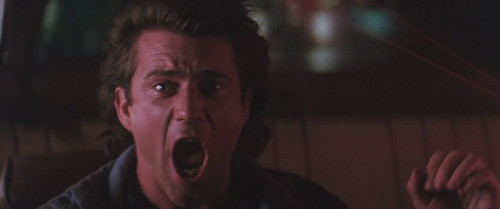
LETHAL WEAPON (1987)
**/**** Image B- Sound B Extras D
starring Mel Gibson, Danny Glover, Gary Busey, Tom Atkins
screenplay by Shane Black
directed by Richard Donner
LETHAL WEAPON 2 (1989)
**½/**** Image B Sound B Extras D
starring Mel Gibson, Danny Glover, Joe Pesci, Joss Ackland
screenplay by Jeffrey Boam
directed by Richard Donner
LETHAL WEAPON 3 (1992)
ZERO STARS/**** Image B+ Sound B Extras D
starring Mel Gibson, Danny Glover, Joe Pesci, Rene Russo
screenplay by Jeffrey Boam and Jeffrey Boam (sic) & Robert Mark Kamen
directed by Richard Donner
LETHAL WEAPON 4 (1998)
*/**** Image A Sound B+ Extras D
starring Mel Gibson, Danny Glover, Joe Pesci, Rene Russo
screenplay by Channing Gibson
directed by Richard Donner
by Walter Chaw It’s tough to convey exactly how fresh Lethal Weapon seemed in 1987. The leap that Woody Boyd’s girlfriend–half-naked in frilly bloomers–takes off a high-rise in the early going, the character of unstable police sergeant Martin Riggs (Mel Gibson, before we knew he wasn’t acting), even the buddying up of Riggs with “too old for this shit” partner Murtaugh (Danny Glover), were smart and groundbreaking. I must’ve watched this movie thirty times in those halcyon days when VHS made stuff like this and porn middle-class pursuits to be pursued in private. Lethal Weapon holds for me, still, this gritty, dirty allure: sexy, violent, nihilistic–like the first time a kid truly reads the Old Testament.
 ***½/****
***½/****
 De rouille et d’os
De rouille et d’os

